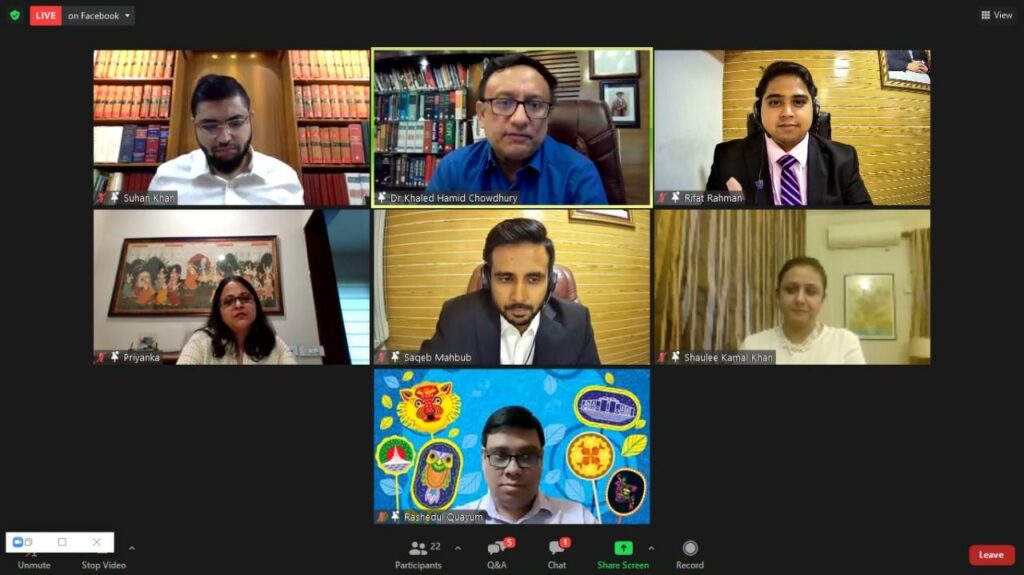
Corporate Lawyers’ Network, a not-for-profit platform connecting corporate lawyers across Bangladesh and beyond, held its first webinar on 19th June 2021, in light of the many challenges faced by law firms and multinational companies in Bangladesh and globally due to Covid-19 and the way that these entities in Bangladesh have adopted technology in an attempt to provide quality legal services during the pandemic.
Barrister Saqeb Mahbub, Partner at Mahbub and Company, who leads the firm’s corporate, M&A, employment and cross-border disputes work, was the moderator of the webinar and delivered the opening remarks for the session. He kicked off the webinar by introducing CLN and its inception during the pandemic, becoming the platform where corporate lawyers can connect together and share their insights. He discussed how the topic for the event arose and why it was of vital importance to have the discussion on legal tech during the ongoing pandemic. He then introduced Ms Shaulee Kamal Khan, Barrister Rashedul Quayum, Dr. Khaled Hamid Chowdhury, Barrister Suhan Khan, and Ms Priyanka, who formed the distinguished panelist of speakers for the event. Barrister Rifat Rahman, an associate of Mahbub and Company, delivered the keynote presentation before the floor was passed over to the panelists.
Barrister Rifat Rahman started off his Keynote presentation by defining legal tech, the advantages to incorporating legal tech in providing services and the barriers to adoption. He then went on to describe how Covid changed things worldwide in relation to holding court hearings and client conferences online via zoom, billing clients electronically, document management for cases, scheduling meetings within the legal team and working remotely from home. He highlighted the apps and software used in the legal sector in Bangladesh and other jurisdictions in an attempt to adapt to the pandemic. He ended his presentation by comparing the legal tech used by India, China, UK and Singapore and noted how technologically advanced countries like Singapore have already initiated the incorporation of AI related softwares in providing legal services.
Dr. Khaled Hamid Chowdhury, the Head of Chambers of Dr Khaled H Chowdhury & Associates (Dispute Management Specialists) and a Barrister of Lincoln’s Inn with 25 years standing and an Advocate of the Appellate Division of Supreme Court of Bangladesh, was the first speaker amongst the panelists. He applauded online dispute resolution’s contribution to saving costs and being an efficient solution for dealing with the backlog of cases while touching upon the drawbacks and challenges in setting off online hearings and arbitrations. He emphasized the need to reshape the legal profession and to have a dedicated server while endorsing protocols to tackle risks to confidentiality. He particularly brought attention to the need for investment into the legal sector and the involvement of all the wings of the state and pointed out that senior members of the judiciary have been proactive in voicing the importance of having a more efficient case management system. He shared his views about how challenges to witness examination might be solved through adopting technology.
Ms Shaulee Kamal Khan, General Counsel, HSBC, noted that while MNCs were better prepared technologically than other organisations, they were still taken by surprise by the pandemic. She commented on how the lockdown has shifted our cultural mindset that had been hesitant in accepting that working from home remotely can still be efficient. She pointed out that MNCs in Bangladesh did not have a workable infrastructure for conducting transactions in the pandemic and an overnight interim set up had to be managed. She drew attention to challenges in Bangladesh in the use of e-signatures and the risk to confidentiality when dealing with sensitive information. Ms Khan opined that organisation in Bangladesh need a database for contracts where all parties can have real time access but she admitted that obstacles exist including a lack of budget to form the required infrastructural set up and regulatory framework for ensuring confidentiality.
Barrister Rashedul Quayum, the Legal Director & Company Secretary of Unilever Bangladesh Limited, shared his insights on the efficiency of MNCs during lockdown. He pointed out the problems that arose in relation to operations due to unclear lockdown guidelines and the challenges he faced in advising the legal team while working remotely from home. He stressed the importance of mental health of employees and how he occasionally held “virtual addas” with the team to allow them to blow off some steam. In terms of adaptability of MNCs, he referred to the GSK-Unilever deal worth 2200 C that took place in June 2020 and how they managed to get the cross-border transaction done despite banks operating in a limited manner.
Barrister Suhan Khan, a Managing Partner of Accord Chambers, recognized that while Bangladesh is adapting to technology, things are not moving fast enough. He pointed out the importance of the legal sector in facilitating digital transformation and cloud collaboration and highlighted problems with GDPR compliance and client confidentiality and the need to meet global standards. He emphasized the importance of digital solutions to accurately calculate billable hours so that clients are not overcharged. He shared his insights on the benefits of interacting with old and prospective clients and sharing legal updates and general information with them online.
Ms Priyanka, the COO of Manupatra (which launched BDLEX.com in 2015) spoke about their latest software- “MyKase”. She highlighted the importance of being efficient and how the software helps in improving efficiency within the legal team, while maintaining client confidentiality. She opined that digital transformation is a cultural change and observed that while adopting new technology may seem like more work, it actually ends up saving time in the long run.
Ms Shaulee Khan reflected, in answer to the popular question of whether lawyers are replaceable by artificial intelligence (AI), that if local firms do not provide low cost services, smart contracts or proactive risk management databases, work will be outsourced abroad and thereby local firms will lose out in the end.
Barrister Saqeb Mahbub concluded the webinar by sharing his thoughts on the importance of law firms rising up to the challenge of adopting technology in order to represent Bangladeshi legal services as a brand globally, and he thanked all the panelists, participants and organizers of the event before signing off.




